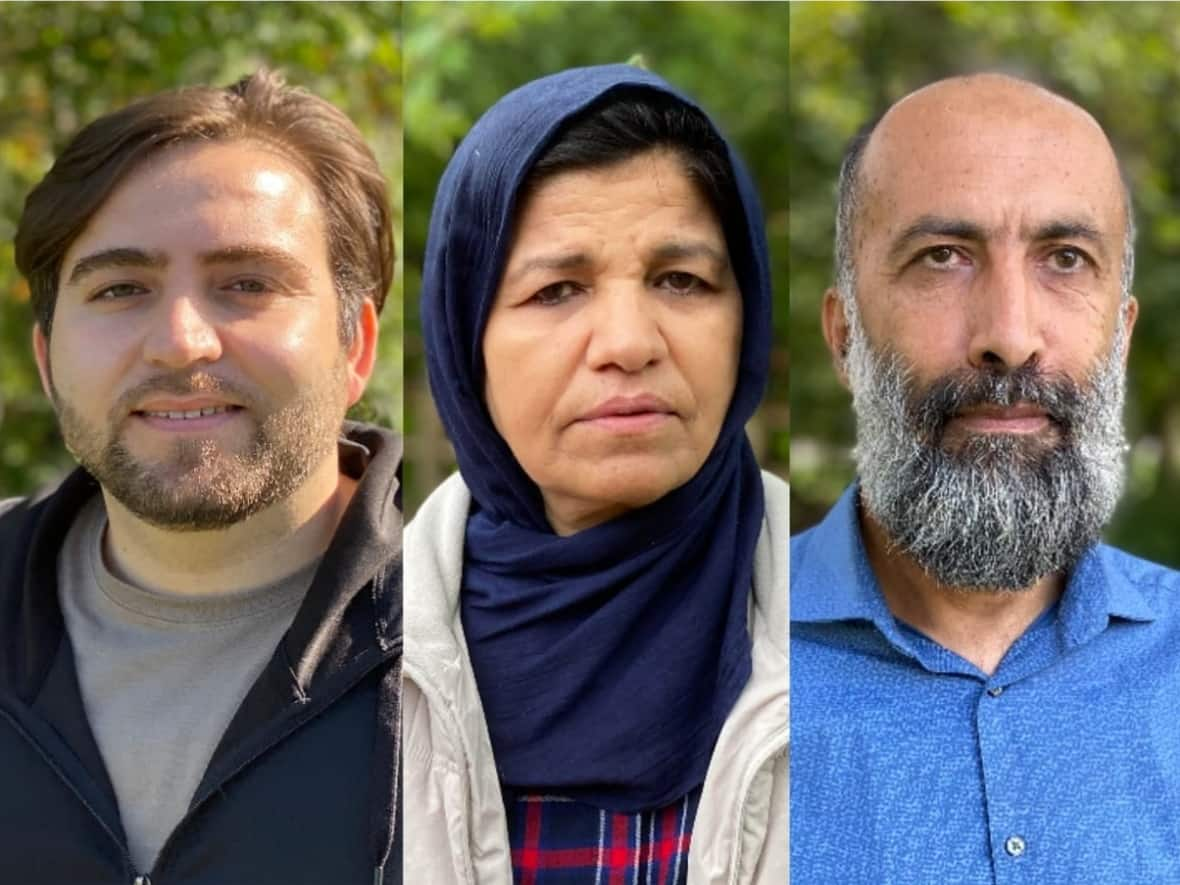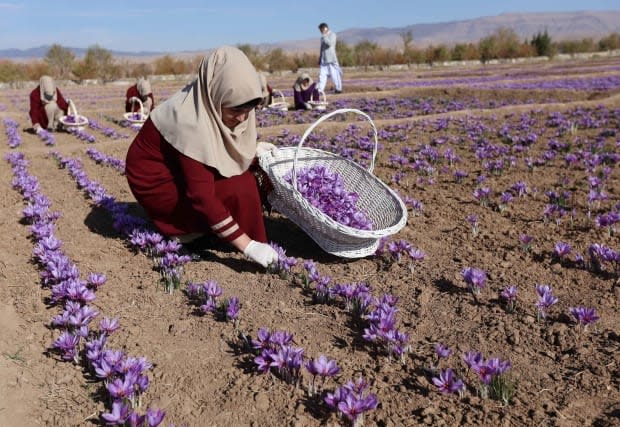After the Taliban takeover, Afghans in Canada call on Ottawa not to let their country, families be forgotten

Thousands of delicate purple blooms sit bathed in sunlight against a background of towering jagged slopes in the Afghan province of Herat, their distinct fragrance gently sweetening the air as they await their fate.
Inside, each bloom contains just three fragile red threads, carefully hand-plucked to produce the world's most expensive spice: saffron.
But this year, as harvest season approaches, the fate of the flowers, picked almost exclusively by women farmers, is in the hands of the Taliban, who will decide if the women will be allowed to gather the blooms, if they'll be picked at all or left to rot.
For Nazaneen Qauomi, it's as if the saffron blooms themselves symbolize the future not only for the farmers but for all of Afghanistan.
After immigrating to Canada in 2014, Qauomi recently visited her home country to create a social entrepreneurship program with a group of women farmers meant to provide them with microloans to eventually launch their own businesses.
"Saffron was the biggest hope they had," Qauomi told CBC News from her Toronto home.

But everything changed when the Taliban swiftly took over as the U.S. made its exit from the country in August. Afghans who escaped their rule decades earlier watched as the country seemed to be plunged back in time virtually overnight.
"It was a shared pain that we all felt and a repeated history that we all saw," said Qauomi. "Especially for my mom, it wasn't easy watching the news, and again repeating all their history of how we used to escape from city to city, how we were afraid of the bombs."
Now, two months after that familiar reality so many tried to forget has once again set in, Afghans like Qauomi fear that as the international community threatens to sideline the Taliban for human rights violations, ordinary Afghans, including women and minorities, will suffer in the process. They are pleading with the world and Canada in particular not to allow their country and their loved ones still there to be forgotten.
'How are they going to survive?'
"We need the world's attention for Afghanistan … not only thinking about what Afghan women should wear but thinking about the biggest problems that people are facing and those are poverty, lack of access to education, lack of access to health centres," said Qauomi.
"All the women who lost their jobs, who are the breadwinners. How are they going to survive?"
WATCH | Nazaneen Qauomi worries for Afghan women who were their family's breadwinners:
Rustam, a Canadian citizen, narrowly escaped Afghanistan after the Taliban took over.
He'd travelled to Kabul to visit his father dying from COVID-19 just before the Taliban moved in. But now he fears for his brother left behind and other human rights defenders like him who he says are likely to be targeted by the Taliban.
CBC News has agreed to identify Rustam only by his first name out of concerns for the safety of his brother, who has a wife and three children but remains stuck in Afghanistan despite working on projects funded by the Canadian government.
"There are a lot of people that have contributed immensely to Canadian projects like my brother but unfortunately they're stuck in the pipeline. These people are highly educated people and they're worried about their future, what will happen to their kids," Rustam said.
"I was one of the lucky ones."
A chance encounter
Having buried his father, Rustam was due to fly back to Canada on Aug. 18. But just days earlier, the Taliban had taken control of Hamid Karzai Airport.
Rustam tried twice unsuccessfully to reach the airport gate amid tear gas and bullets, but gave up after hours of waiting, worried for the wellbeing of his mother and wife who had secured the paperwork to join him in Canada.
On his third attempt, it was the same. The Baron Hotel gate, where the Canadian government had told him to show up, was flooded with people. The family was going to turn back when a boy, around 15 years old, seemingly helping people navigate the area for a small fee, asked where he wanted to go.
WATCH | He escaped the Taliban. Now he's calling on Canada to bring over those who assisted it:
Rustam was hesitant. It was impossible to know whom to trust. He told the boy he needed to reach Canadian soldiers and gave him $5. The boy told him to follow and together, they wove through the crowds to another gate where he was able to speak directly to an American soldier who connected him with the Canadians.
Days later, the crowded sewage canal near Abbey gate that he, his mother and wife trudged through to make it to safety was blown up in a suicide bombing. Rustam has no idea if the boy who saved his life survived.
"That kid, actually, he's probably the reason I'm here," he told CBC News. "It was because of him that I was able to find a way … I hope he is OK."
'They are at risk because of me'
Sediqa Nawrozian never intended to leave Afghanistan.
The women's rights activist with a master's degree in public law had published several books back home. A member of the Shi'a minority, she had been in Halifax for a conference on women's leadership in 2016 when her brother called and told her not to come home.
The Taliban had tracked down her address and showed up asking for her, threatening her family, he told her. Overnight, Nawrozian became a refugee, separated from her family and facing an uphill climb to find work in a country where she had no experience and where her credentials might not be recognized.
WATCH: Sediqa Nawrozian on dangers women activists and minorities face in Afghanistan:
In the years since, Nawrozian, now a Canadian citizen, has acquired numerous certificates but has had trouble finding work in her field of expertise, with COVID-19 making the task that much harder. For now, she volunteers to teach women in Toronto's Thorncliffe and Flemingdon Park neighbourhoods to sew as she tries to secure paperwork for her family to flee.
"I'm thinking about my family because they are at risk because of me and I'm here now. What happens with them?" Nawrozian said.
"Not just my family. All the minority community in Afghanistan is at risk, all the families that their daughters, their wives, their members work for the women's rights, work for the human rights, against the Taliban. All those families are now at risk. They don't know what will happen for them in the future. That's my concern."
'Talking doesn't mean being a friend'
Mohammad Hashim Nazarwal had been in Afghanistan for his mother's funeral when the Taliban seemed to be encroaching on Kabul. No one seriously believed the capital would be taken, but Nazarwal remembers the day he realized the U.S. wasn't going to stop them.
Afghan security forces "left their humvees on the road, changed their clothes, left their uniforms and took taxis home," he told CBC News.
WATCH I Mohammad Hashim Nazarwal on why the time for Canada to talk to the Taliban is now:
"The whole Afghanistan operation was a failure," Nazarwal said after returning to Toronto. "Lives are lost, resources are lost … the common guy never benefited."
Still, he said, for the U.S. to leave as suddenly as it did has meant ordinary Afghans are being punished for not stopping the Taliban when even foreign forces failed to quell them.
What's needed now, he said, is dialogue with the Taliban.
In a statement to CBC News, Global Affairs Canada said it "remains committed to Afghanistan" and has announced an additional $50 million in humanitarian assistance since Aug. 26 for Afghanistan and neighbouring countries on top of the $27.3 million already allocated for Afghanistan this year.
"If the Taliban choose to ignore fundamental human rights — the rights of women, girls, and minority groups — they should expect international isolation," the statement said.
But talking doesn't mean recognition, said Nazarwal. "Talking doesn't mean being a friend. There should be a channel to dialogue."
"It's such a passive policy only to sit until America comes on … this is against democratic laws, it is harming the Canadian policy, prestige, there is a responsibility for the Canadian government to act.
"This is the beginning of tragedy…. If the Canadian government doesn't pay attention to this, tomorrow it will be [too] late. The same mistakes will be repeated in another form."

 Yahoo Movies
Yahoo Movies 
